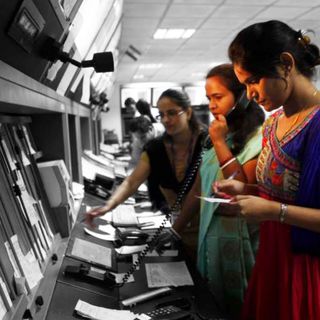
Will Making Acting Awards Gender Neutral Make Them More Equitable?
Removing the binary of male-female awards will help queer artists — but it also might mean men win all the awards.

Acting awards have increasingly populated the conversation around gender inclusivity in pop culture. From the MTV Movie & TV Awards to the BAFTA to the Daytime Emmys, more and more academies that give accolades to artists have either removed the gender binary from their awards, or have started considering merging the Best Male Actor and Best Female Actor categories. The debate, however, rages on: will making acting awards gender-neutral increase inclusivity for non-binary and gender-fluid artists, or will the one-for-all category mean all the awards go to men?
Many academies that have opted for gender-neutral awards — most recently, the National Academy of Television Arts & Sciences, which administers the Daytime Emmys, announced merging its Young Performer categories — have flaunted the decision as the modern and progressive way to lead the conversation around gender. When the MTV Movie & TV Awards announced its merging of the actor categories in 2017 and awarded Emma Watson the first-ever gender-neutral award, MTV President Chris McCarthy told CNN, “We have to constantly be pushing ourselves to not only respond to culture but lead it. … If we’re going to do an award show that celebrates content, why would we not modernize what that looks like? … [People today] don’t see those [gender] lines in the way that generations in the past have. So we wanted to take those down. They felt really antiquated.” Watson said in her acceptance speech, “With acting, you put yourself in someone else’s shoes. … The only distinction should be between each outstanding performance.”
That’s one of the arguments for making awards gender-neutral — that actors, regardless of gender, should be recognized for their work, skills, and talent, rather than be categorized based on their gender. Directors, cinematographers, sound designers — none of these award categories are bifurcated by gender, then why acting? This division also keeps out actors such as Billions’ star Asia Kate Dillon, who identifies as non-binary and had penned a letter to the Television Academy that administers the Emmys asking them to which category she should submit her work. Because she didn’t identify or express as male or female, there was seemingly no place for someone like her to be lauded. “I’d like to know if in your eyes ‘actor’ and ‘actress’ denote anatomy or identity and why it is necessary to denote either in the first place?” Dillon had written. “The reason I’m hoping to engage you in a conversation about this is because if the categories of ‘actor’ and ‘actress’ are in fact supposed to represent ‘best performance by a person who identifies as a woman’ and ‘best performance by a person who identifies as a man’ then there is no room for my identity within that award system binary. Furthermore, if the categories of ‘actor’ and ‘actress’ are meant to denote assigned sex I ask, respectfully, why is that necessary?”
Related on The Swaddle:
When looked at from Dillon’s perspective, making awards gender-neutral seems like the next step in ensuring people of all genders get recognized for their work and are not boxed in by antiquated notions of the male-female binary.
But the flip side is that making these awards gender-neutral is not going to cause an overnight transformation of the biases that exist within the film and TV industry, nor is it going to radically influence the prejudice of the viewers who are often called upon to vote for best artist by these institutions. If everyone is grouped within the same category, then who emerges victorious?
Unfortunately, the numbers suggest the answer to that question is one you might have already guessed: men. For gender-neutral categories that already exist, such as Best Director or Original Screenplay, the nominees, and subsequent winners, are overwhelmingly men. In the history of the Oscars, since 1928, only five women have been nominated for Best Director, and only one — Kathryn Bigelow — has won the award (for Hurt Locker in 2010), Glamour analyzed. It was only in 2018 that the first woman ever was nominated for Best Cinematography at the Oscars (Rachel Morrison for Mudbound). In the writing and editing categories, only 10% and 14% of the nominees have been women, respectively, Glamour reported.
On to the category at hand: acting. Amongst the top-grossing films of 2018, only 35% of films had 10 or more female characters with speaking roles, as compared to 82% of films that had 10 or more male characters with dialogues, according to research by the Center for the Study of Women in Television & Film. It shows women actors only bagged 35% of all speaking characters in these films, and were protagonists in only 31% of the films. This, according to research, was a “historic high.” The organization concluded audiences were twice as likely to see male characters in these films than they were female characters.
How does this translate to who gets the awards? The Television Critics Association that administers the TCA Awards have had gender-neutral categories for acting — Individual Achievement in Drama and Individual Achievement in Comedy — since its inception in 1996. In that time, men have received 67% of total nominations in both categories and have won 69% of the awards, The Wrap reported. It was only in 2017 that women, for the first time, dominated in nominations at the TCA Awards — of the 14 gender-neutral nominees, 11 were women.
Related on The Swaddle:
Ranveer Singh Is Mainstreaming Dandyism
The anti-gender-neutral award argument goes: “It sucks to silo women, but the truth is, if these all-women awards and categories did not exist, then for a long time women just wouldn’t have won anything at all,” The Guardian’s Hannah Jane Parkinson explained. Even today, most women actors are disproportionately affected by ageism; as long as they can portray the sultry love interest of the probably much older male lead, they’re golden — the moment it looks like they’re aging, they’re sidelined into the margins to waste away in low-budget romcoms that are an insult to their talent.
And sure, with Hollywood producers such as Reese Witherspoon, directors such as Greta Gerwig, and actresses such as Viola Davis fighting for gender parity in movies, maybe we’re slowly arriving at a point where we don’t need to ensure women’s talent is acknowledged and rewarded by putting them in a separate category — they will just dominate the industry based on their own skill and will not be met with any gendered obstacles that halt their progress. But that day is not today. If the rest of the industry has not caught up with the times, making the awards a poster child for progressiveness might do more harm than good. At the end of the day, this isn’t remotely about the awards, but about who gets equal opportunities, and equal recognition, within the media. Awards are but a gesture in that complicated process — without fixing the foundation, the celebrated awards ceremony is but a decorated, yet unstable roof.
For now, awards such as the Emmys have offered a stop-gap. In response to Dillon’s letter, the Academy told them that they were welcome to submit themselves under either category — male or female — and the Emmys wouldn’t interfere with their process of self-determination. And while this still furthers a binary, which is 100% antiquated, the alternative might be worse. What good is having your gender considered, when there is a very real chance it will never be rewarded?
Rajvi Desai is The Swaddle's Culture Editor. After graduating from NYU as a Journalism and Politics major, she covered breaking news and politics in New York City, and dabbled in design and entertainment journalism. Back in the homeland, she's interested in tackling beauty, sports, politics and human rights in her gender-focused writing, while also co-managing The Swaddle Team's podcast, Respectfully Disagree.
Related


Only 37 of Every 100 Jobs Created in India in 2019 Went to Women
